#Mission Report Umbra Speaking
Explore tagged Tumblr posts
Text
Gonna try and hangout here on Tumblr more often. I enjoy it here and Instagram's recent updates are pissing me off and the bird app is a cesspit I will NEVER dive in.
I wish the Tumblr app had a multi-login function cause I have 2 main accounts and I am not logged into this one on my phone.
That being said you can reach me most often @magnificentbastardanon
1 note
·
View note
Text
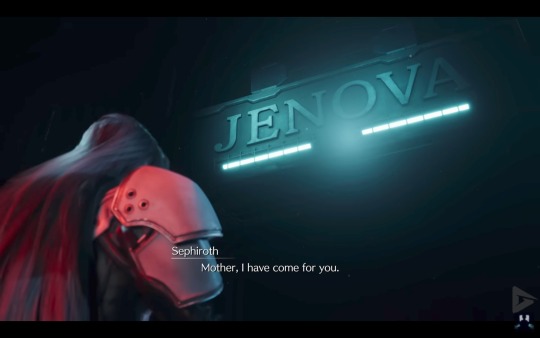
Here’s a particular detail to wonder about. How does Sephiroth gain access to the Jenova chamber when he arrives at the Mako reactor after pillaging Nibelheim?
We don't see him using any keycards or entering any passwords. There are no mechanical locks or keys to speak of. We don't see him tampering with any remote terminals in the mansion or the reactor itself. There is no indication that he is using voice commands either. He simply says "Mother, I have come for you. Now, open the way for me", and it magically opens after he's dealt with Tifa.
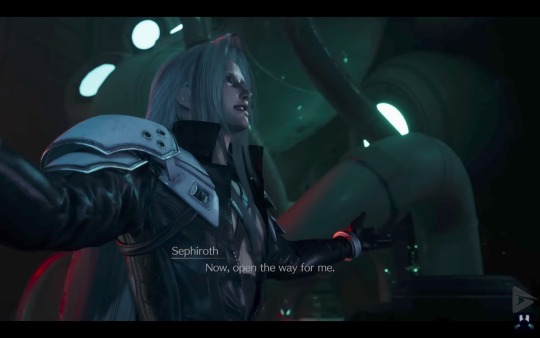
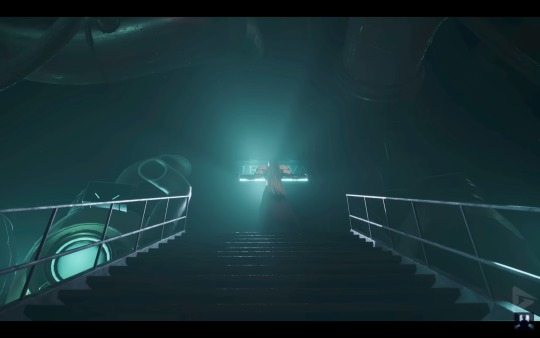
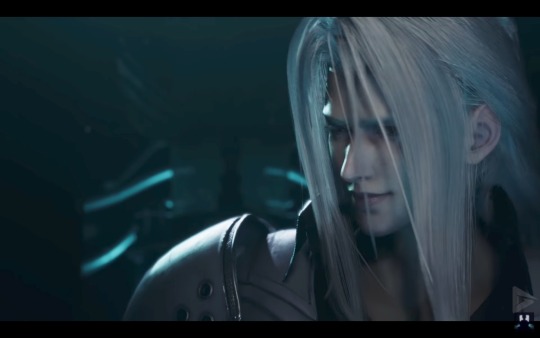
Interestingly, there is an odd device attached in front of the Jenova tube that resembles the entity and appears to be linked to some type of circuitry. When Sephiroth plucks it away, we see tubes and cables rupturing and leaking liquid.
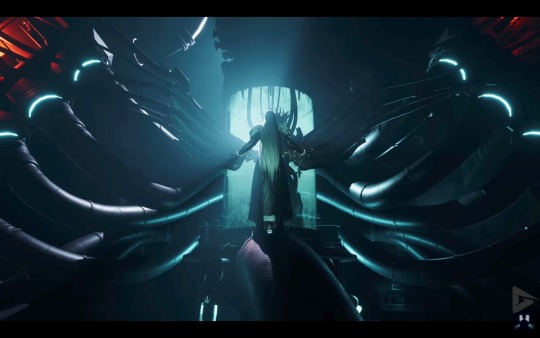
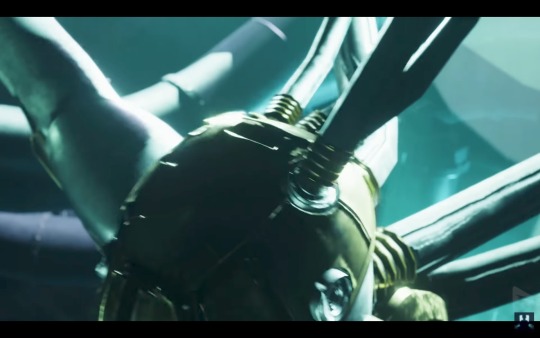
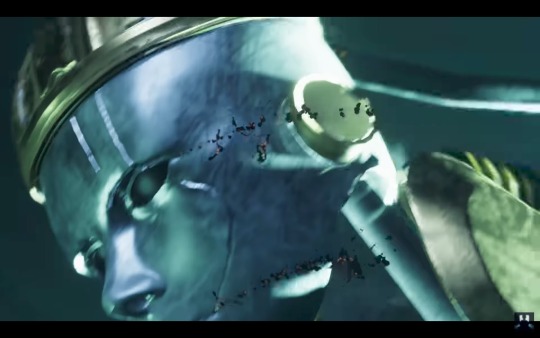
Based on the FFVII Remake, we know that Hojo had extensively experimented with Jenova cells, even imbuing machinery with them, as witnessed at the Drum. The evidence suggests that its organics can, in some cases, interact with various devices.
This raises the question whether Jenova's chamber was connected to the entire reactor complex, or at least the portion housing the test subject pods. If this is true, the phrase "Now, open the way for me" takes on a far more sinister meaning. Even more disturbingly, it raises yet another troubling possibility. Who's to say that if Jenova could tamper with the sealed door, it couldn't also tamper with the pod system? In other words, what if the creature was responsible for the entire alleged "reactor malfunction"?.. [some additional speculation on Jenova being “awake”]
Another potential conspiracy theory emerged immediately after the original game was released. What if Hojo orchestrated the Nibelheim mission? While there is no solid evidence that Hojo or his assistants recently visited the site (the townspeople would have likely noticed the visit or the helicopters heading towards reactor H-pad), Sephiroth goes out of his way to emphasize that the Nibelheim reactor is unique in that it is under Research & Development jurisdiction rather than Urban Development dept.
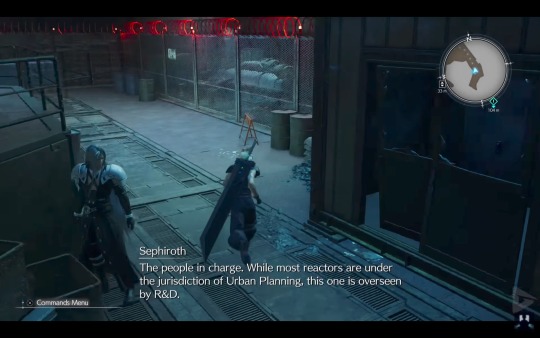
R&D most likely had a remote monitoring/control system for the chamber environment. Hojo, in particular, has expressed an interest in Palmer's testimony that Sephiroth was seen walking the halls of ShinRA headquarters, famously stating that he would like to see Sephiroth and Aerith produce an offspring.
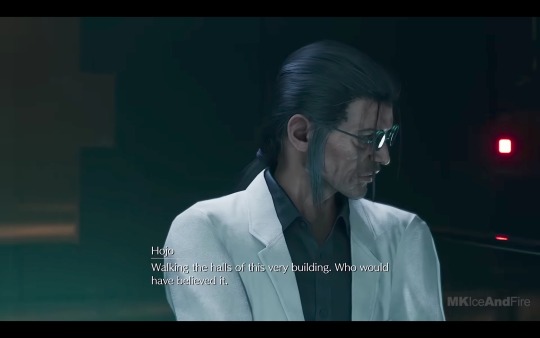
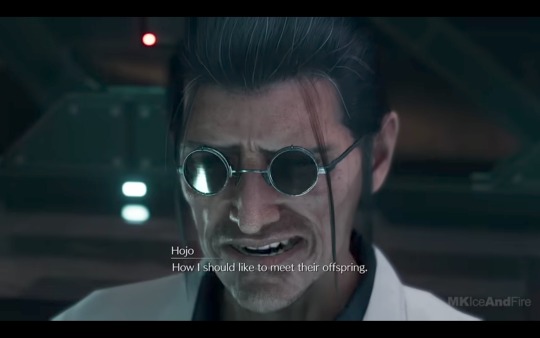
Later in OG, Hojo was shown to be fascinated by his pet theory of Reunion being played out. As a result, it's not unreasonable to speculate that Hojo may have specifically arranged for Sephiroth to be dispatched to Nibelheim to observe Jenova specimens come into contact and its corollary. If there were security cameras in the Jenova chamber, Hojo might have been able to remotely unlock the door [upon seeing Sephiroth approach].
It is indeed a terrifying possibility that Hojo could be directly responsible for the Nibelheim tragedy. Before Crisis Core and Genesis, In OG, prior to Genesis stuff being introduced, it seemed suspicious to send two top SOLDIER members to a remote and dilapidated reactor to investigate reported monster sightings.
@pen-and-umbra
#sephiroth#jenova#hojo#ffvii#ff7#final fantasy vii#ffvii rebirth#ffvii remake#ff7 rebirth#ff7 remake#ffvii@luv fandoms
54 notes
·
View notes
Text
Session Summary: Preparations
Next morning after the celebrations, Ferenir doesn't remember anything after he got drunk, which is rare for him (but I rolled a 3,4,5 and Nat1, so fuck me), but he decided to have a shower and fix the bed he apparently broke during the night, which he does successfully. Then, until the others woke up, he decided to play and spend some time with Booby, and got the idea to teach him to read, since the slime has shown signs of high intelligence.
After an introduction into the alphabet and Booby showing a small sign of evolving, they are interrupted by the party gathering to discuss their preparations. Ferenir will take care of their equipment, and Aramil and Horny will look for information.
The party separates, and Ferenir visits Bertrand, the city blacksmith and now friend...who has finished the dragonborn's order. Ferenir had gathered powerful materials in his travels, the fangs of Shadowfang, a powerful magical beast they found dead in their first mission, the spine of a giant, and his own very hammer as a base. He had commissioned Bertrand to make a weapon like no other, and the blacksmith did not disappoint.
He presented to Ferenir Umbra Fang, a two handed, large, spiked hammer, with the ability to transform to a flail at will, through the giant's spine extending with the aid of magical mithral. Apart from that quality, Umbra Fang does additional damage due to the fangs used as spikes, with the ability to release a wave of necrotic energy a few times per day. As if that wasn't enough, once per day, Ferenir can channel the giant's might and increase his strength for a limited duration.
A truly gorgeous weapon fitting a legendary warrior, now laying in Ferenir's hands. As he provided all of the material, Bertrand wants only a small price for the work, but Ferenir additionally offers him his dragon crystal blade in a trade.
Leaving the man to rest, Ferenir takes over the smithy, and spends the majority of the day smelting the adamantine of his shield and using it to restore his armor, the one that belonged to the ancient paladin whose undead body they defeated in a tomb, to its original glory.
Done with that, he bought new and improved armors for Aramil and Horny, aiming to improve their defenses....he will protect them, of course he will, but he knows very well that nothing protects a person better than good old steel. And he will be damned before he loses a friend with his hands down.
Speaking of the devil, the two pass by the smithy and the party meets up, where the other two wear their new gear and inform Ferenir that they need to visit the Church, where the cultists had attempted to steal an artifact. The priestess refuses to cooperate with the guards....and our only hope is Horny, for who the priestess has expressed....strong desires for, much to the poor man's dismay and disgust.
Alas, sacrifice for the greater good, no? So, they all head to the church, Horny enduring the constant laughs and teasing of the shitheads he calls friends, until they are stopped by two large priests blocking the way. They allow Horny to enter, as he is a....'chosen' of the priestess, but they bar the entry to the other two. And most importantly, when Ferenir tells them politely that he is there to 'pray to the gods, as this is the only church in town, so they should kindly fuck off', they make the mistake to hit him with the threatening "Excuse me? What did you just say?" Possibly the worst choice and tone of words one could ever use.
Ferenir feels a vein pop in his head, and walking up to them, picks immediately a fight about how they deny entry to the faithful, go against their duties as priests and defile holy ground, threatening to report them immediately to the authorities..or worse. The nat20 on that roll helps the priests maintain their physical wellbeing by backing off from arguing with the pissed off dragonman, and the Misfits enter the church together...
3 notes
·
View notes
Text
Dawn of the Future summary- Lunafreya (Part 1 of 2)
Luna’s section of the book opens with the part that was read by her voice actress during the Final Active Time Report, which is the death scene from her point of view.
-She reflects on the last time she parted from Noctis as King Regis fled with him from Fenestala Manor in Tenebrae, when she deliberately let go of Regis’ hand so as not to slow him down. Noctis’ expression and the way he reaches out to her are the same. She smiles for him, glad that the water hides her tears, then breaks down sobbing when he can no longer see her. -Gentiana appears and lulls her to sleep, the same way that she did when Luna was a child. Luna drifts in a daze for an uncertain amount of time, then wakes up in a pool of shallow, dirty water in a crypt “Reshiel” (レシエル) which she has visited before to perform a ceremony as Oracle. (On the boundary between the Succarpe and Eusciello regions). -She finds a scrap of newspaper wrapped around an old bouquet of flowers that says it has been three years since the disappearance of Prince Noctis, but the newspaper itself is old. -She is pursued by a Reaper and flees the crypt, emerging in a ruined graveyard. She takes a tree branch to fight off daemons. At first, she thinks it is night, but then realizes that the skies are covered in miasma. She is shocked by the state of the world, apparently having expected that Noctis would purge the darkness after she delivered the ring to him. -The Reaper continues to pursue her, but she hears a passing motorcycle and jumps in the sidecar, surprising the driver, who is also trying to flee the daemons. The girl on the motorcycle says that the load is slowing them down, at which Lunafreya throws a sack of goods out of the sidecar, but the girl responds that the “load” she meant was Luna. -The driver gets off the bike to fight the daemons with a shotgun, telling Luna to stay back, but Luna refuses, feeling she must fight. Fighting them with a tree branch doesn’t go well, and in desperation she ends up using a new power, absorbing the daemons. When she is wounded, miasma comes to the surface and heals the wound over. The girl points the shotgun at her, calling her a monster. Lunafreya feels that she can’t deny this, not knowing what she is herself. The girl collapses. Luna thinks about taking and hiding her guns, but she’s carrying too many. -When the girl wakes, Luna introduces herself as “Lunafreya Nox Fleuret”, which the girl says is the name of the Oracle who died ten years ago. Noctis has also been missing for ten years. Luna is shocked by this, having given her life so that Noctis could fulfil his mission. Luna tells the girl that she can’t prove (or know for sure herself) if she is a friend or foe, or even if she is the real Lunafreya. The girl introduces herself as Sol. -The bike has broken down, so they end up pushing it to the nearest outpost. Luna is shocked to hear there are no inhabited areas outside of Lestallum, and Insomnia is practically a nest of daemons. The only people in former Niflheim territory are Hunters and Kingsglaive. -The outpost, Well (ウェール), is empty but Sol manages to get Cindy on the phone. Umbra appears to Luna, and she realizes Pryna is dead. Umbra only communicates in barks and tail wags, but she manages to discern that Noctis is alive. She finds a notebook and pen and writes “I’m okay” on it, but Umbra refuses to take it to Noctis. Luna accepts that it is not possible at the present time, and wonders where Gentiana is. -Sol asks Cindy if she thinks Luna could be the real Oracle, and tells her to get in touch with Gladio about it. Luna helps her repair the bike. -Luna has a dream in which Bahamut speaks to her. She recalls Gentiana teaching her about the Gods, and that, while Shiva, Ifrit, Leviathan, Titan and Ramuh govern the forces of nature on Eos, Bahamut alone is the god of the heavens that surround Eos, and above the other five. -Bahamut gives her a vision of Noctis defeating Ardyn, Luna is shocked that the darkness doesn’t dissipate after his victory and horrified when she sees Noctis sacrifice himself on the throne in order to pass into “the beyond” and destroy Ardyn’s soul, then crumble and disappear himself. This is not what she thought her calling was when she delivered the ring to him. -Bahamut says that this is the calling that the True King should have fulfilled. He then shows her a vision of a daemonic Ardyn and Ifrit, saying that Ardyn turned his back on the will of the Gods, expanding his power to the point that the Ring cannot dispel it. He assigns her the new calling of defeating Ardyn herself. Luna is unsure if she can do it, but willing to try, to save Noctis. -Sol brings Luna new, black clothing. Luna requests to be taken to Insomnia to fulfil her new mission. Sol can’t believe she intends to fight Ardyn, but agrees, “Lestallum first, then Insomnia”. However, since they are in Niflheim territory, they first have to make it to a port and then cross the sea to Lucis. -They search for the tins of food that were in the luggage that Luna threw out of the sidecar the previous day. They realize that Luna can see in the dark better than a normal human. Like a daemon. -The motorbike is named “Regina”. It’s not very reliable and they need to stop and make repairs frequently. -There are outposts along the train lines, at former stations. They don’t run into any other people, but they stop to rest and drink tea. Sol asks where Luna learned to fight with a spear, Luna says it was part of her training as Oracle, for self-defense. She can take down small daemons with the spear, but needs to use her power for large ones, and is concerned about the Starscourge that accumulates in her body from this. -Sol asks more about being an Oracle. The training includes physical fitness- running, swimming and meditation. There’s also visiting statues of previous Oracles, and singing and dancing. Sol says it sounds fun. Luna says there were also difficult things, such as fasting and spending many days isolated. -Luna says she did these things to fulfill her duty, but Sol can’t understand why she’d want to be Oracle if it’s difficult and there’s no reward. Luna can’t understand wanting to be rewarded for doing what one is obligated to. -Luna begins writing her thoughts and experiences in the notebook as a letter to Noctis, much longer than their past messages. -The next morning, Sol calls Biggs, who refers to her as “Miss A.’s little Miss”, despite her objections. He tells her Aranea is currently out on a mission to a certain set of ruins, and to meet him and Wedge in Nome, the largest outpost in Niflheim territory. -Luna dreams about trying to contact Gentiana, asking if she knew that the Ring would kill Noctis. She states her intention to fight Ardyn, but admits she’s frightened of becoming something not human. However, Gentiana’s image is faint, and Luna cannot hear her voice when she speaks. Luna reads the word “Bladekeeper” from her lips, and when she tries to approach Gentiana, Bahamut’s swords fall from the sky and block her way. -She wakes. Sol tells her to hurry up and get moving, but denies anything is wrong. -Sol asks Luna if anything good ever happened because of her belief in the Gods, and if her belief was the reason that they brought her back to life. Luna says that she was brought back to life to fulfill her new calling, to defeat Ardyn. Sol questions why she has to save the world alone, and why the Gods never gave the power to defeat Ardyn to anyone else. She questions Luna’s belief in the Gods and if she would believe in them if she weren’t the Oracle. -With tears and anger she says that she once believed, until Niflheim fell, and the Gods ignored her pleas to not lose everything. Luna thinks of times when she arrived too late to heal people as Oracle, and the anger and sorrow she could see in people’s eyes even though they didn’t voice it. Sol says that she refuses to lose anything else.
287 notes
·
View notes
Text
Why Jupiter's Moon Has 'Misplaced' Volcanoes.
The market was wrong in overpricing the assets after its own IPO, sending shares to as high as $Forty Five a share. So our team put all that behind us as well as had 6 weeks out on Blue Moon over Xmas to bounce back. Balanced appropriately, though, and Libra Moon is influenced to courageous and also about her real tribe. I was in Canada, likewise exploring family members as well as Blue Moon (our property) was actually tied in El Salvador. Richard Hoaglands book Dark Mission which I'm in the center of reading enters into great particular regarding the duty NASA has actually played in the disinformation method also that they are actually the begetters from the Fake Moon Landings story. The gentle Sunshine of the morning and also the tranquil Moon of the evening, both encourage me tremendously and also I really love to watch all of them for internal tranquility as well as calmness.
When the Moon wased initially developed this was actually 14,000 miles (22,530 kilometres) far from the Earth. I just liked the technique you opened - it had never occurred to me the potential for a moon practical joke. Determining the noise from Joon Moon is performer Krystle Warren, who diet2You-Portal.info strong, rich vocal offers the tracks a soulful, cocktail lounge feel. The Hong Kong customer immediately relabelled this The Blue Moon of Josephine", Bennett informed media reporters, noting that this had likewise established a world document for any sort of gem at greater than $4 million every carat. Throughout an overall photo voltaic eclipse, the darkness of the moon besets the surface area from the Earth. If you visit southerly Italy, Guatemala, central Chile or even Argentina, volcanic ash might offer you a Blue Moon there also. Now the very best technique left is to steer clear of unhealthy food, indeed once in a blue moon excels along with prepackaged food however eating processed food also each week could result in significant difficulties in lifestyle. That's because by time totality begins, the moon is going to be actually specifying quickly in the west equally the sunshine is rising in the east. The shadow, or even umbra of the Moon is so little that it only skips an extremely tiny portion from Planet. By Means Of a Blue Moon Opportunity, globe first, they are using Seachange Lodge Resort as a World Wide Web Sweep. Due to the fact that from its own distinct color, quality as well as dimension, the deep blue stone has actually been actually grouped as an extremely considerable locate. On speaking to a variety of clinical staff involved in natural giving birth, the first thing I found out was actually that expectant mommies commonly experience untrue indications of delivery in the course of moon. The normal meaning from a Blue Moon is the second Moon in a schedule month. Many in the U.S. area community, like moon rocketeer Neil Armstrong, are annoyed through Obama's propositions to boost help for exclusive space companies and also leave an over-budget NASA moon program.
0 notes
Photo
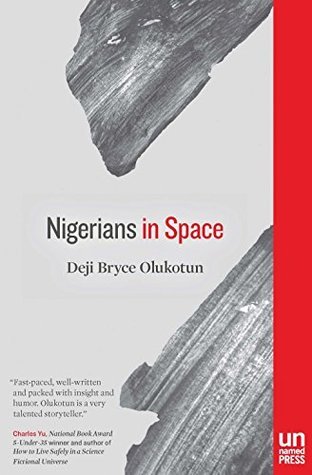
NIGERIANS IN SPACE BY DEJI BRYCE OLUKOTUN
reviewed by AISHWARYA SUBRAMANIAN
“Yeah, but what does that snowglobe mean?”
Deji Bryce Olukotun’s Nigerians in Space begins in 1990s America, where Wale Olufunmi, a lunar geologist, is attempting to steal a sample of moon rock from the NASA laboratory where he works. The sample is insurance, proof of his commitment to “brain gain” (the return of Nigerian academics to their home country as a corrective to the intellectual exodus to the West colloquially termed “brain drain,” about which so many countries worried during those years), and to a Nigerian space programme organised by the politician Nurudeen Bello to achieve it. Wale steals the rock—a contingency sample collected during the first moon landing, scientifically worthless but symbolically valuable—and smuggles it out of the country in the base of a snow globe. His plans rapidly fall apart, however, and Bello is mysteriously uncontactable. He finds himself stuck in limbo with his family, neither able to return to his American job, nor to enter Nigeria without a visa, witness to a murder, and in danger of arrest.
The bulk of the novel’s action takes place twenty years later. Wale, with his now-grown son Dayo, has settled in South Africa, where he runs a bamboo business out of his home, gives tours at the Royal Observatory, and has developed an obsession with finding Bello. Dayo has taken his father’s snow globe as the inspiration for a lamp which recreates natural moonlight. The two men’s lives intersect at various points with those of Thursday, a hapless abalone poacher of Malaysian descent, and Melissa, later Melle, a Zimbabwean girl with an unusual form of vitiligo that makes her skin glow with moonlight. Melle’s father is another of Bello’s victims and it is through her attempts to find out what has happened to him that we learn that most of those associated with the Brain Gain project have mysteriously died.
If all of this makes Nigerians in Space sound more like a thriller, all secret societies and high body counts, than a work of SF, that is probably accurate. None of its Nigerian characters gets to go into space. Within this sprawling, international, pan-African plot, few of them seem even to make it to Nigeria. And yet.
In September of last year, India (and if this feels like a bit of a geographical detour, such a thing is entirely in keeping with the events of this book) successfully sent a probe into orbit around Mars. The New York Times responded with a cartoon of a skinny man in a dhoti and turban, leading a cow, knocking on the door of a building marked “Elite Space Club,” with large, tuxedoed men seated inside. The paper later apologised for the offense caused, and offered a more flattering interpretation of this cartoon, but even here the humour was supposed to come from the incongruity of it all—the notion that a nation that could be represented by underfed farmers might have any place in what had been “the domain of rich, Western countries.”[1]
It’s an incongruity of which Nigerians in Space is well aware. The title is deliberately ludicrous (that “ . . . in SPAAAACE!” is what does it), and this is the book’s big challenge to the reader. What is being raised here, in the title as well as the text itself, is the whole question of who gets to imagine space, who gets to imagine themselves in space. In reality Nigeria does have a space programme, and has done for some years now (as do Egypt, Tunisia, and South Africa, among others). Olukotun, who is Nigerian-American, has claimed that one reason he did not know this when he started writing the book was that “it seemed too ridiculous to even be worth researching—I had made the idea up!”[2]
In late 2014 Africa2Moon, a crowdfunding campaign, was set up to facilitate the first phase of a pan-African mission to the moon. The campaign faced some criticism online over whether this should be a priority at all—surely there were other, more immediately useful things that such money could be spent on. But, in addition to the practical uses of a space programme that might be trotted out to counter this argument, explained the project manager, Jonathan Weltman, the moon had tremendous symbolic value. “You can walk outside and there it is [. . .] Kids across Africa can pull out a telescope and see it.”[3]
Wale also has to justify his interest in space travel in general, even to his wife. “It’s not the moon that’s important: it’s what that trip to the moon will produce. We’ll have communications satellites, improved crop yields, accurate population censuses. Nigeria doesn’t need weapons. We need innovation.” But it is the moon that is important (you can walk outside and there it is)—and it’s no accident that Dayo’s invention later in the book is tied more closely to the idea of the moon in its abstract form than to the space programme that, in the world of the book, seems not to have happened after all. This sense of the moon as a concretised symbol for a larger ideal (or several ideals) is one that recurs throughout Nigerians in Space. In Wale’s first conversations with Bello, the possibility of a Nigerian mission to the moon is presented as a form of reverse colonisation—both a satisfying response to the historical fact of colonialism and a kind of perpetuation of it.
“He said [the moon rock] didn’t belong to America but all humanity. He said we would return it to the moon when we landed our first mission as a symbol of ‘the colonized returning the cultural patrimony of all mankind.’ He wants us to plant a Nigerian flag.”
Science and symbol, science and story. In an episode later in the book, Dayo reports yet another failure to sell his lamps. “What story do you tell them about the lamp?” asks Wale:
Dayo went through his routine, trying to emphasize the technical parts. He used the words “luminosity” and “umbra” and “aqueous medium” with what he hoped was familiarity.
Wale then shows his son a part of the observatory where he works as a tour guide—a manhole once partly filled with mercury, used as a mirror to observe the sky.
“Can you imagine looking into a pool of mercury? Gauging the stars in a pool of quicksilver like an alchemist? It would be like floating in space [. . .] This is a popular part of my full-moon tour. It has nothing to do with selenometry anymore. No practical value. But this is where I get my repeat customers [. . .] You’ve got to come up with a story. Put some tension in it.”
You’ve got to come up with a story, and Nigerians in Space contains several. There’s the thriller plot, the SF plot. There’s a novel of exile and loss set in a fundamentally diasporic world (“No one knows what happened and I can’t go to Nigeria anymore . . . Because I’m a refugee”). There’s also an entire reading of the novel, one that appeals to me very much, which ignores all else and focuses on Wale’s personal relationship with the moon; his movement from scientist to priest (though even at the beginning of the book he “couldn’t defile a piece of the moon”). Wale becomes the moon’s chief storyteller, simultaneously narrating humankind’s historical relationship with it and inviting tourists to “look into the telescope and see your future.” If you (the reader) could fish around in the thick soup of meanings Wale ascribes to the moon and pick one, could make the moon a single, stable symbol to build on, perhaps the whole thing would begin to make sense.
Because the moon is what ties together the various strands of Nigerians in Space, Thursday’s abalone and Dayo’s lamp both feed off it, in different ways—as does the luminescence in Melissa’s skin. But is it the physical moon or the symbolic? What is the quality that the abalone (surely among the most SFnal of earthly creatures) recognise in Dayo’s lamps? Are we to read the “purity” of the light from the lamps as scientific innovation or as being somehow connected to the moon rock, on whose hiding place their design is based? Is Melle’s condition a biological one? Science or symbol: it’s partly in these questions that the novel’s claims to being science fictional, rather than science fiction-adjacent or even fantastic, rest. Unusual skin conditions and superior forms of solar energy may be less spectacular than the space travel promised by the title, but they deserve some attention.
In a different (and far more trite) book this constant referral back to the moon could work as a sort of levelling force—characters of Malaysian and Nigerian and Zimbabwean descent living in South Africa and France, and America, all seeing the same moon. Late in the novel, in what would in other circumstances be a climactic scene, Dayo’s lamps are strung up in the streets and they work, and the soft light from the lamps briefly erases all difference. But it’s not allowed to be a triumphant moment.
You’ve got to come up with a story, and Nigerians in Space, frustratingly, won’t let you. There’s no neat tying up of ends here. The mystery is unsolved, the thriller plot peters out. There’s so much meaning here and stories are, after all, only stories. If the novel does have a climactic scene it’s a confrontation between two of its protagonists, fittingly in the observatory, that ends in tragedy and leaves both with all their questions left unanswered. It’s a powerful scene, and a moving one, and it tells us nothing.
And of all the stories the book doesn’t tell, perhaps the most important is the one in which Nigerians go into space. In an article in Slate the author speaks about travelling to Nigeria and meeting a scientist at the National Space Research and Development Agency, whose real endeavours and successes are so easily erased by this book’s narrative of failure. “I had also learned the perverse burden of responsibility placed on an author who writes speculative fiction,” says Olukotun, but also: “Would you have read that story?”[2] I return to that title, and the story it tells about science and science fiction and who they’re for and whose triumphant journeys into the cosmos our collective imaginations allow. How much easier to imagine Nigerians on earth.
Endnotes
Source: "India Mars Mission: New York Times Apologises for Cartoon", BBC News, 6 October 2014 (accessed 12 October 2015). [return]
Source: "Meeting My Protagonist" by Deji Bryce Olukotun, Slate, September 2014 (accessed 12 October 2015). [return]
Source: "Africans Urged to Back Continent's First Moon Mission", The Guardian, 5 January 2015 (accessed 12 October 2015). [return]
0 notes
Text
_Introduction...
Greetings everyone, I am Umbra Nocturnes! Also just Umbra.
Thisis my official Tumblr blog! I will be posting stuff relevant to my book series tentatively titled "The Violinist" and "As Above so Below" as well as other side projects! I am a LGBTQIA+ writer/artist who is Aroace and Non-binary (They/them (you may also use he/him) ). I'm also neurodivergent/suffer from mental illnesses so please be patient with me. I'm not a monolith, I make mistakes. If you want more stuff from me I also have a fandom blog!
I sometimes take commissions and have Ko-fi for tips! You can find the info in my carrd as well as other socials [Here]!
You can find me and my original stuff active here:
Instagram: @/_umbranocturnes_ [HERE] ["main"]
Discord: [Ask]
Bluesky: @/umbranocturnes [HERE]
My Tags:
#reblog
#TW: [insert name]
#Mission Report Umbra Speaking - [Admin stuff]
_Disclaimer!...
My work heavily involves historical themes, especially military history! One of my series takes place during the Second World War and contains both axis and allied characters.
I also work with: The Great War (WWI), Victorian Era, Medieval Europe ect! So if works with themes affiliated with those time periods disturbs you best move past my blog.
I do not support ideologies of the time periods my works take place in! My stories are historical fiction. I create fictional events, characters, or organizations that don't exist, so don't expect 100% accuracy. I am not an expert, do your own research and fact-check!
I give as much context as I can with the knowledge I have. I am nowhere near done with research, stuff might be inaccurate. It's not my intent to be misleading it happens. Feel free to correct me if you know more about something than I do, but ALWAYS cite sources!
Context is important in historical settings, I choose different censoring methods based on context. Not everything on this blog will be censored.
I have TW tags for posts so you can blacklist/filter tags! (( #TW: [insert name] ))
If you run across something you feel should be censored, please reach out through DMs and tell me! Sometimes I miss things, I am not a monolith, people make mistakes! It's not intentional and I appreciate people letting me know so I can fix it.
_Book Summaries!...
Let's get into something fun shall we?
"The Violinist"
A story set during WWII. Beginning in 1941, we follow a man named Setheroth Noctus brought back from the dead as a supernatural being once again thrown into a life of war. Caught up in the events of the Second World War, he joins up with his old Lord Valerius as an allied spy, working with the British Special Operations Executive (SOE) and other British intelligence organizations to spy on the nazis from within the ranks of high command itself. Together they carry out various forms of sabotage to damage the nazi war effort all while struggling to blend in and maintain their cover. Setheroth struggles with leading a double life as a fraudulent high ranking SS commander with men under his command, and being a saboteur serving the British crown and its allies in dismantling the nazi war machine. Facing constant internal struggle, along the way he makes some unexpected allies, while discovering more about himself than he bargained for. This story also follows along with the misadventures of one Brahm Faulkner, a British physician and long time friend of Valerius, as he and his friends struggle to survive in war-torn Britain and across the Allied fronts. The events of the war change their lives irrevocably forever.
(This story has LGBTQIA+ pairings, LGBTQIA+ main and supporting characters as well as drama, tragedy, romance, suspense, historical-fiction, an supernatural elements. It is a fictional war story. An no I will clarify- it's not just "bury your gays"/nazi victims. They are proper characters with influence on plot!)
"As Above so Below"
A collection of short stories (a document) containing the lore of my dead beings and their world. It builds upon concepts used in "The Violinist". Some short stories follow important figures throughout events in the dead realm's collective history and provide insight into how they live. There are two realms, that of the living and that of the dead. The dead realms are inaccessible to humans, but all manner of dead beings reside therein. The dead realm encircles our living one, ever expanding and invisible. There are three realms that make up the "dead realms" Ilyraeyl (Elysium), Tenebraeyl, and Oblivion. Elysium and Tenebraeyl are home to unique dead being races and ruled over by a council of Lords plus their "King" that rules over all. Oblivion, a realm of ash and vast grey desert lays barren. Nothing resides where dead being's ashes return to rest. Only one man has ever resided therein regarded as a traitor, and an entity responsible for unfathomable destruction.
(This also has many LGBTQIA+ characters + relationships. It is lore with dark "gothic" overtones, high-fantasy, drama, historical anachronisms, ""comedy"" (gallows humor) etc... with supernatural queers behaving both good and badly.))
_Final Warnings...
I do not tolerate bigotry!
This blog is not a place for neo-nazis, extremists, reichblr, wehrbos, holocaust-denial, genocide-denial, anyone who romanticizes fascism or supports denial of human rights. Although some of my work is set in dark points of history an some characters act/think in bigoted ways, I the admin DO NOT support bigots! I fucking hate bigots they can fuck right off. I am part of the LGBTQIA+ community and am an LGBTQIA+ friendly admin.
2. I do not condone the use of AI-generated work or NFTs, for profit or otherwise!
I do not consent to my work being used in generative AI work of ANY KIND. Even recreational. Also goes for NFTs. This is written in my commission TOS and I am making it public here. Do what you want with your work, not mine!
3. I try to keep current politics off my blog.
Well- I try to keep most of my politics to myself for the sake of my sanity. (I'm not good at it- since things going on currently rile me to no end) Do not assume all things I post reflect my views on politics, that is very wrong. If you must know, I consider myself very progressive with some anarchist leanings. Modern politics are a huge trigger for me, so I prefer to engage with it privately on my own terms as I am often not in a good headspace. I care a lot because it affects us all, but I have to curate my spaces to also be safe spaces for me. Please respect these boundaries.
4. I might share history meme nonsense but keep jokes sensible.
We can have jokes and memes, but I DO NOT tolerate certain jokes from certain assholes. No, your holocaust jokes are not funny they are shitty. You don't have "dark humor" you're just an asshole.
[Updated: 24/02/25]
2 notes
·
View notes